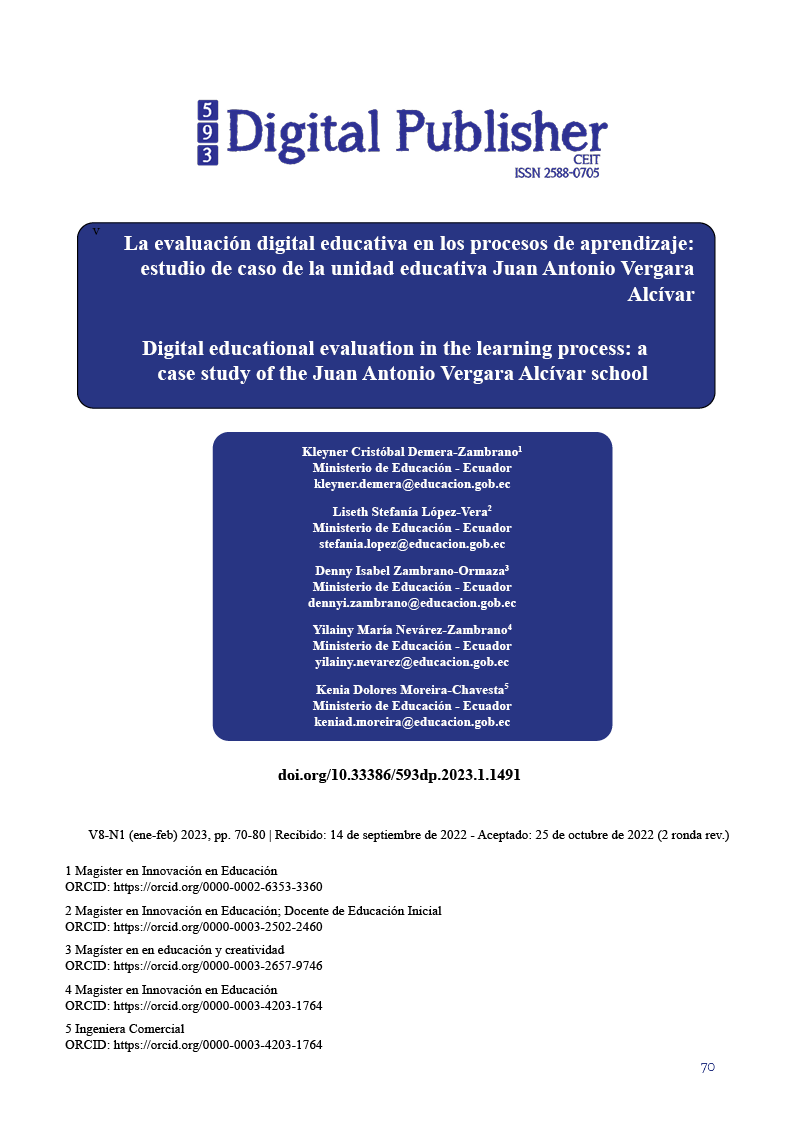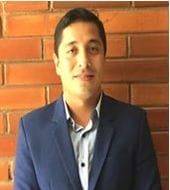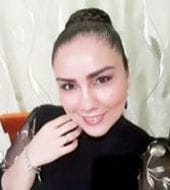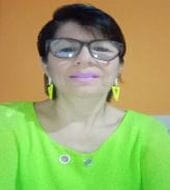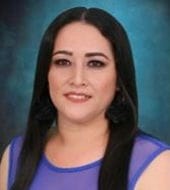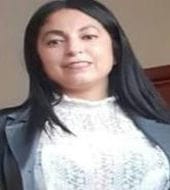La evaluación digital educativa en los procesos de aprendizaje: estudio de caso de la unidad educativa Juan Antonio Vergara Alcívar
Main Article Content
Abstract
The current knowledge society is surrounded by digital environments that require specific skills to function in them. All this leads to a digital evolution, to a change that develops continuously in different rhythms, contexts and areas. Being the educational part, one of the most affected by these transformations, which in many cases is a problem for teachers and students who have little or no digital skills. For this reason, this work aims to analyze the digital evaluation in the learning processes of the Juan Antonio Vergara Alcívar Educational Unit. In this study, descriptive bibliographical research was used, with a qualitative-quantitative approach. Analytical-synthetic and inductive-deductive methods and statistical method were applied. As a data collection instrument, a survey with multiple choice questions was applied to a sample of 30 teachers. The results obtained conclude that teachers apply digital evaluation in the learning process, obtaining multiple benefits to improve the quality of education, however; the percentage of its use remains low, thus limiting the development of digital abilities and skills in students. Therefore, it is necessary for teachers to be trained in digital assessment issues to streamline the processes of knowledge acquisition.
Downloads
Article Details

This work is licensed under a Creative Commons Attribution-NonCommercial-ShareAlike 4.0 International License.
1. Derechos de autor
Las obras que se publican en 593 Digital Publisher CEIT están sujetas a los siguientes términos:
1.1. 593 Digital Publisher CEIT, conserva los derechos patrimoniales (copyright) de las obras publicadas, favorece y permite la reutilización de las mismas bajo la licencia Licencia Creative Commons 4.0 de Reconocimiento-NoComercial-CompartirIgual 4.0, por lo cual se pueden copiar, usar, difundir, transmitir y exponer públicamente, siempre que:
1.1.a. Se cite la autoría y fuente original de su publicación (revista, editorial, URL).
1.1.b. No se usen para fines comerciales u onerosos.
1.1.c. Se mencione la existencia y especificaciones de esta licencia de uso.
References
Casanova, M. A. (2002). Ámbitos de la educación. Instituto Hidalguense de Educación,
Universidad Pedagógica Nacional-Hidalgo. Tesis de maestría
http://upnmorelos.edu.mx/assets/evaluacion-educativa.pdf
Falcó, J. (2017). Evaluación de la competencia digital docente en la Comunidad
Autónoma de Aragón. REDIE. Revista Electrónica de Investigación Educativa,
(4), 73-83. ttps://doi.org/10.24320/redie.2017.19.4.1359
Galdeano, C., & Antonio, V. (2009). Educación por competencias. Revista Evaluación Educativa, 21(1), 28-32. ttps://doi.org/10.1016/S0187-893X(18)30069-7
Hernández, R., Fernández, C., & Baptista, P. (2014). Metodología de la investigación. McGraw Hill.
Santos Guerra, M. Á. (2002). La evaluación: un proceso de diálogo, comprensión y mejora. Instituto Hidalguense de Educación, Universidad Pedagógica Nacional- Hidalgo. http://upnmorelos.edu.mx/assets/evaluacion-educativa.pdf
Tiven, M., Fuchs, E., Bazari, A., & MacQuarrie, A. (2018). Evaluating Global Digital
Education: Student Outcomes Framework.
https://www.oecd.org/pisa/Evaluating-Global-Digital-Education-Student- Outcomes-Framework.pdf
Barberá, E., & Suárez, C. (2021). Evaluación de la educación digital y digitalización de la evaluación. Revista Iberoamericana de educación a distancia, 24(2). 33-40. https://revistas.uned.es/index.php/ried/article/view/30289/23119
Foronda, J. M., & Foronda, C. (2007). La evaluación en el proceso de aprendizaje.
Perspectivas, 19, 15-30. https://www.redalyc.org/pdf/4259/425942453003.pdf
Frías, M., Arce, C., & Flores, P. (2016). Uso de la plataforma socrative.com para alumnos de Química General. Educación química, 27(1), 59-66. https://dx.doi.org/10.1016/j.eq.2015.09.003
Gobierno de Canarias. (2018, enero). Kit de Pedagogía y Tic.
http://www3.gobiernodecanarias.org/medusa/ecoescuela/pedagotic/producto/qu i zizz/
Guerrero, J. (2019, febrero 3). Estrategias para mejorar la evaluación en el salón de clase. Docentes al día. https://docentesaldia.com/2019/02/03/estrategias-para- mejorar-la-evaluacion-en-el-salon-de-clase/
Leyva, H., Pérez, M., & Pérez, S. (2018). Google Forms en la evaluación diagnóstica como apoyo en las actividades docentes. Caso con estudiantes de la
Licenciatura en Turismo. Cenid, 9(17). https://doi.org/10.23913/ride.v9i17.374
Lezcano, L., & Vilanova, G. (2017). Instrumentos de evaluación de aprendizaje en entornos virtuales. Perspectiva de estudiantes y aportes de docentes. https://publicaciones.unpa.edu.ar/index.php/ICTUNPA/article/view/560
López, H. (2005). La evaluación como componente del proceso enseñanza aprendizaje.
EduSol, 5(13), 38-46. https://www.redalyc.org/pdf/4757/475748652004.pdf
Martínez, G. (2017). Tecnologías y nuevas tendencias en educación: Aprender jugando.
El caso de Kahoot. Opción, 33(83), 252-277. https://dialnet.unirioja.es/servlet/articulo?codigo=6228338
Mejía, G., Toala, G., & Valverde, F. (2017). Modelo para evaluar el uso de la tecnología para el aprendizaje y la adquisición del conocimiento dentro del proceso de enseñanza aprendizaje. Publicando, 4(11), 228-247. https://revistapublicando.org/revista/index.php/crv/article/view/523
Oyola, J. (2015). Uso de la plataforma Educaplay en las capacidades del área de inglés en los estudiantes del 2do año de secundaria de la I.E. “San Antonio de Jicamarca” Vitarte; Lima, 2015 [Tesis de posgrado, Universidad César Vallejo]. https://repositorio.ucv.edu.pe/bitstream/handle/20.500.12692/8420/Oyola_GJ.p df? sequence=1&isAllowed=y
Picón, G., Rodríguez, N., & Rodríguez, A. (2021). Prácticas de evaluación en entornos virtuales de aprendizaje durante la pandemia COVID-19 y el regreso a la presencialidad. Saeta Universitaria Académica y de Investigación. https://doi.org/Armando https://doi.org/10.1590/SciELOPreprints.2690
Tirado, F., Backhoff, E., & Larrazolo, N. (2016a). La revolución digital y la evaluación:
Un nuevo paradigma. 38(152). https://www.redalyc.org/pdf/132/13244824011.pdf
Tirado, F., Backhoff, E., & Larrazolo, N. (2016b). La revolución digital y la evaluación:
Un nuevo paradigma. Perfiles Educativos, 28(152), 182-201. https://www.redalyc.org/pdf/132/13244824011.pdf

